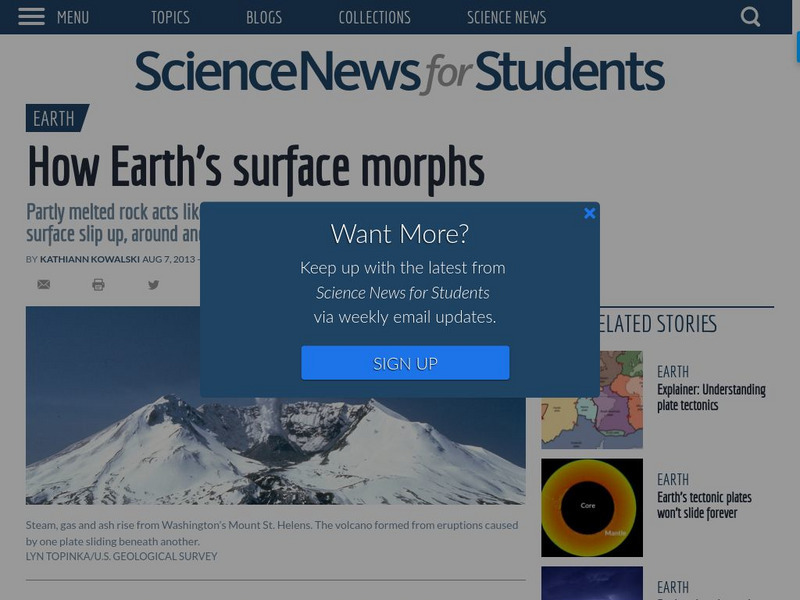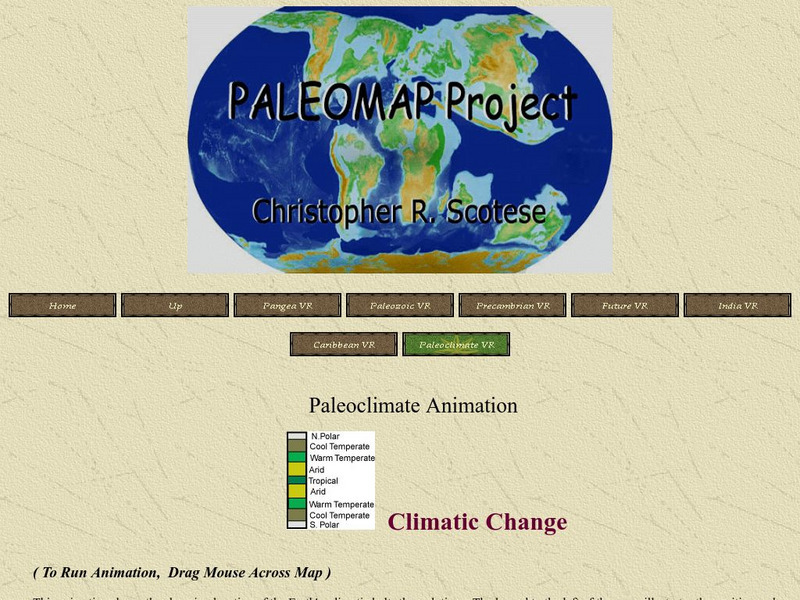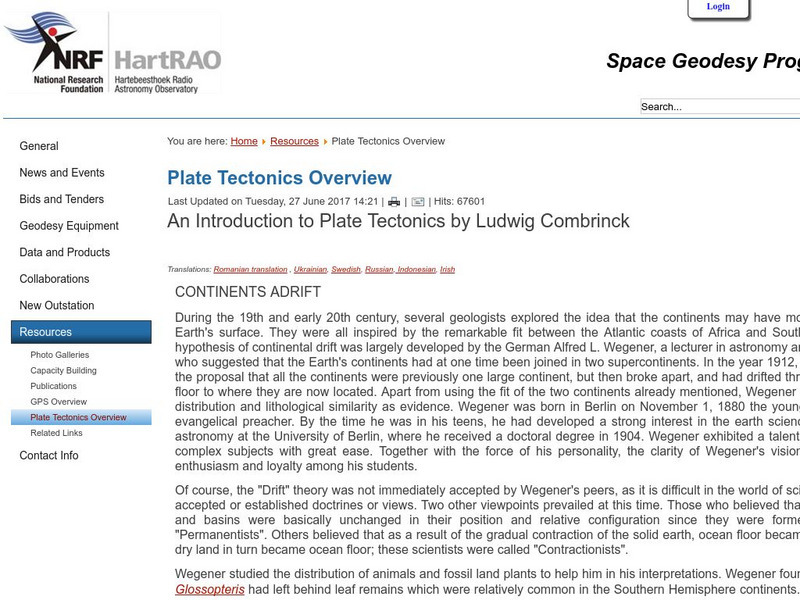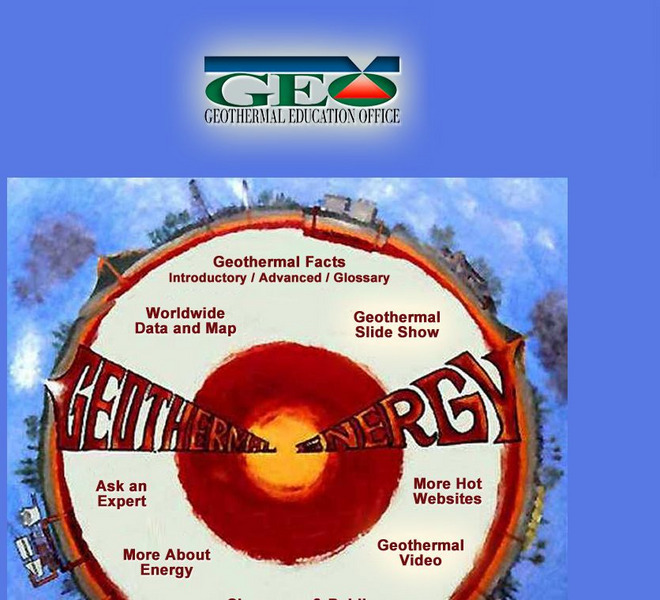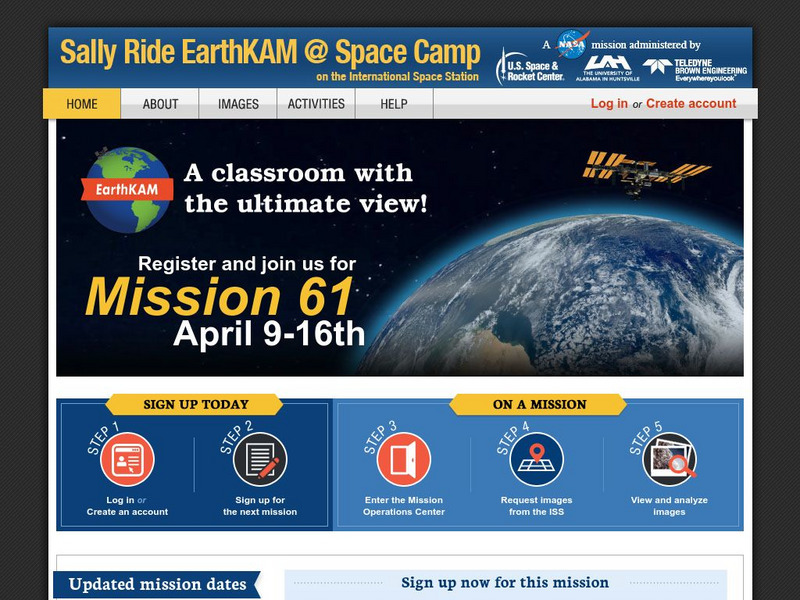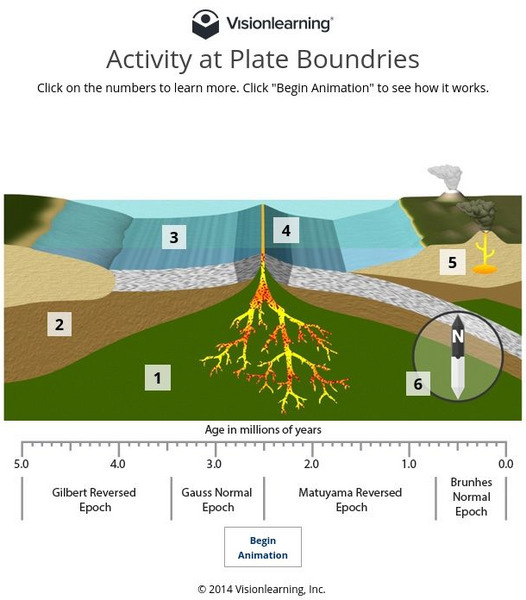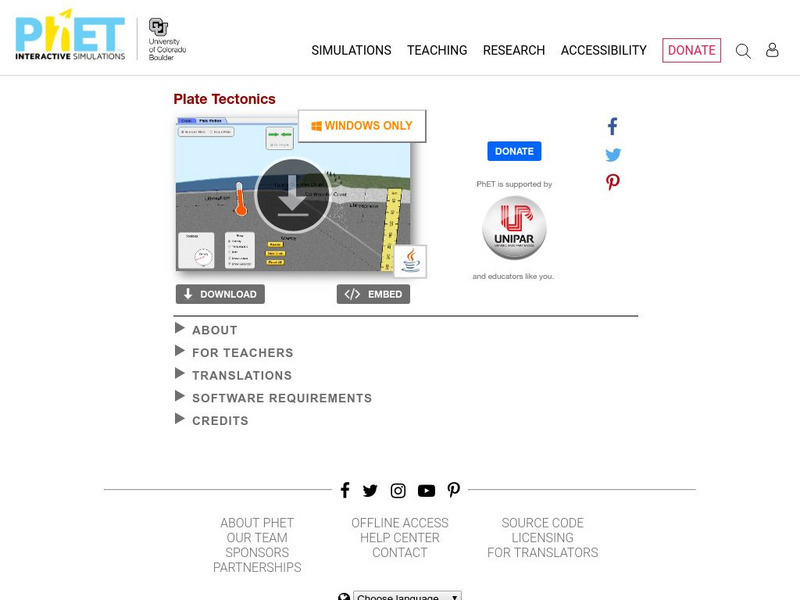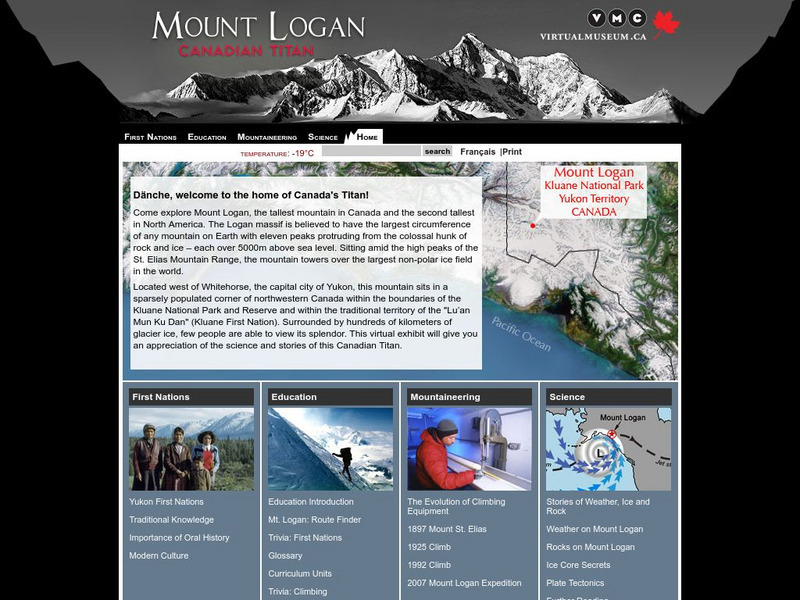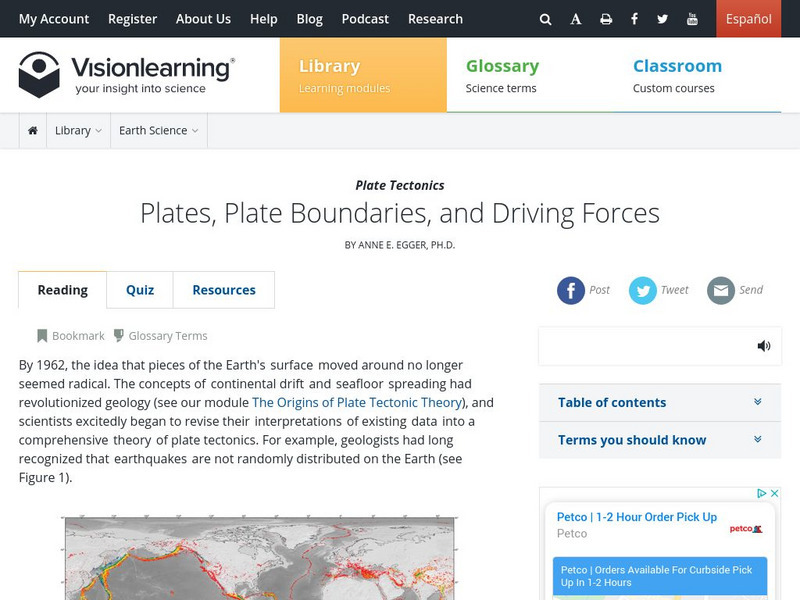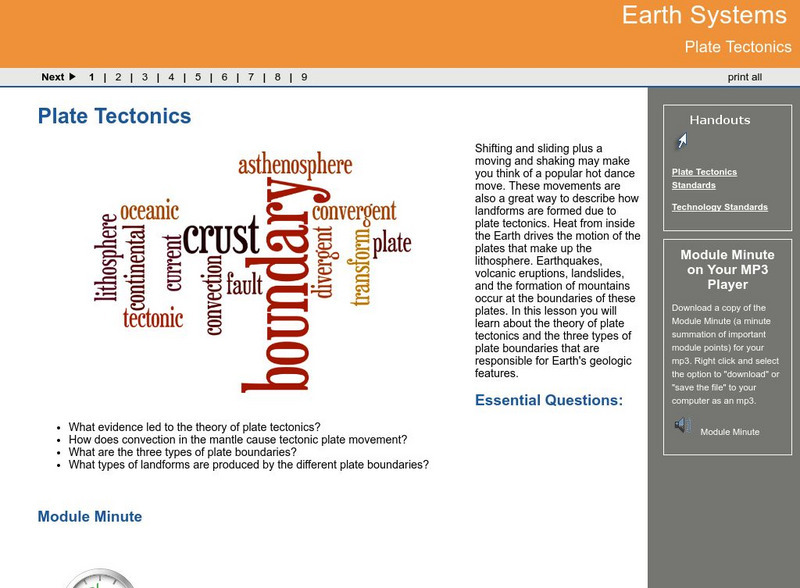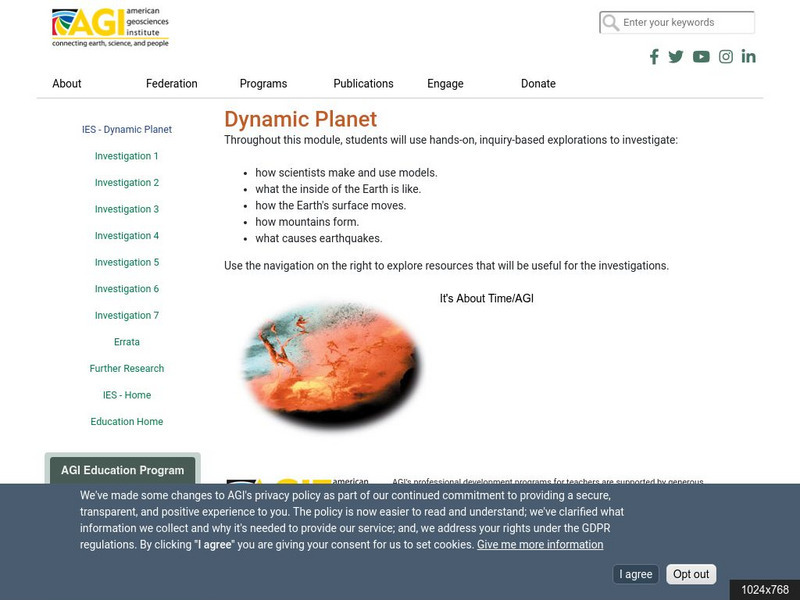Society for Science and the Public
Science News for Students: How Earth's Surface Morphs
Article reports on how the surface of the Earth changes over time. Includes a list of vocabulary words from the article.
Other
Digital Library for Earth System Education: Teaching Box: Plate Tectonics
A suite of lessons focusing on finding the fossil evidence for lithospheric plate tectonics. Inquiry-based exploration of plate tectonics evidence includes fossil distribution, earthquakes, and volcanoes.
American Association for the Advancement of Science
Aaas: Project 2061: Topic: Plate Tectonics
[Free Registration/Login Required] Create a science test that checks for student understanding in science, for common misconceptions, as well as for correct ideas. This is a list of key ideas related to Plate Tectonics. For each key...
Other
Paleoclimate Animation
This animation allows you to see how the continent's climates changed as they drifted throughout history.
PBS
Pbs: A Science Odyssey
Website for the PBS series "A Science Odyssey." Numerous opportunities to explore the people and discoveries of science.
Other
Paleomap Project: Earth History
The PALEOMAP Project illustrates the plate tectonic development of the ocean basins and continents, as well as the changing distribution of land and sea during the past 1100 million years. Includes virtual 3D paeloglobes.
Other
Hartao: An Introduction to Plate Tectonics
Introduces South African Alexander Toit as naming Gondwanaland and Laurasia.
Other
Usgs: Geology in the Parks
Details regarding the geology of national parks in the United States.
Other
Geothermal Education Office
This resource for geothermal energy education features a slide show with instructive graphics.
Other
Nasa: Iss Earth Kam
Students get a whole new perspective of the world through images obtained from the International Space Station. Students can even request images to be taken through ISS EarthKAM. Activities and educator guides are provided.
University of California
University of California: Understanding Earthquakes
This website is a resource for learning about earthquakes. Java animation at this site helps you visually understand the causes of earthquakes.
US Geological Survey
Usgs: The San Andreas Fault
A great overall site that tells us about the San Andreas fault, where it is and what kind of movements have occurred. It then goes on to talk about earthquakes in general and their occurrences along fault lines.
NOAA
Noaa: National Ocean Service Education: Global Positioning Tutorial
Illustrated tutorial explains the history and science of geodesy. Animations help students visualize how scientists measure and monitor the size and shape of the Earth and the location of points on its surface.
PBS
Pbs News Hour Extra: You Don't Need a Seismograph to Study Earthquakes
Three part lesson will provide students with information about earthquakes and how to predict them using various Web sites. Activities include historical background on major earthquakes, investigating mechanical waves, and simulating...
US Geological Survey
Us Geological Survey: Ring of Fire & Plate Tectonics
A massive amount of information on the Ring of Fire and plate tectonics. There are links to graphics and text. The volcanoes in the Ring of Fire are discussed in detail by area.
Vision Learning
Visionlearning: Activity at Plate Boundaries
A simulation that demonstrates divergent plate boundaries and seafloor spreading. A focus is on evidence of the Earth's normal and reversed polarity over geologic time in the rock record.
University of Colorado
University of Colorado: Ph Et Interactive Simulations: Plate Tectonics
Windows only - Interact with the tectonic plates of the Earth and see how changing variables affects the plates.
Smithsonian Institution
National Museum of Natural History: Paleobiology: The Cambrian Period
Journey into the past while reading this comprehensive overview of the Cambrian Period that covers topics such as the Cambrian Explosion, Burgess Shale fauna, trilobites, fossil evidence, and climate and plate tectonics.
Smithsonian Institution
National Museum of Natural History: Paleobiology: The Ordovician Period
Journey into the past while reading this comprehensive overview of the Ordovician Period that covers topics such as reef ecosystems, Paleozoic Fauna, fossil evidence, and climate and plate tectonics.
Smithsonian Institution
National Museum of Natural History: Paleobiology: The Archaean Eon
Journey into the past while reading this comprehensive overview of the Archaean Eon that covers topics such as early continents and oceans, first life on Earth, Earth's atmosphere, fossil evidence, and plate tectonics.
Virtual Museum of Canada
Virtual Museum of Canada: Mt. Logan: Canadian Titan
Mt. Logan in Canada's Yukon Territory is the tallest mountain in Canada and the second tallest in North America. Learn about the people who live around it, the history of mountaineering in the area, and the science - both geological and...
Vision Learning
Visionlearning: Earth Science: Plate Tectonics Ii: Plate Boundaries and Forces
Instructional module focusing on plate tectonics. Discussion includes plates, plate boundaries, and driving forces. Site also includes an interactive practice quiz and links relating to the topic.
Georgia Department of Education
Ga Virtual Learning: Plate Tectonics
In this interactive lesson you will learn about the theory of plate tectonics and the three types of plate boundaries that are responsible for Earth's geologic features.
American Geosciences Institute
American Geosciences Institute: Dynamic Planet
Seven hands-on lessons module where students learn about our dynamic planet. These inquiry-based explorations investigate scientific models, earthquakes and seismic waves, Earth's interior, Earth movements, the lithosphere, plate...


